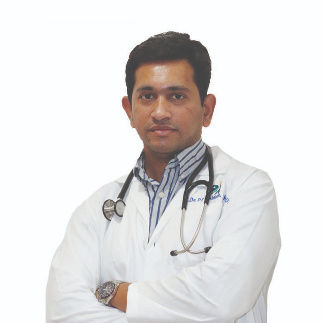Regular Pulmonary Care
Discover essential tips on regular pulmonary care, including common lung diseases, risk factors, diagnosis, treatment options, and preventive measures. Learn how to maintain healthy lungs through lifestyle choices, early detection, and effective management of chronic respiratory conditions.

Written by Dr.Sonia Bhatt
Last updated on 3rd Jul, 2025
Introduction
The respiratory system plays a crucial role in overall health, providing oxygen to the body while expelling carbon dioxide. Pulmonary health is essential for maintaining quality of life, and regular care helps prevent and manage lung-related conditions. Various factors, including environmental pollutants, lifestyle choices, and genetics, influence lung health. This blog explores the common pulmonary diseases, their causes, and management strategies can help individuals take proactive measures for healthier lungs.
Common Pulmonary Diseases
Pulmonary diseases affect millions of people worldwide. Some of the most prevalent conditions include:
1. Chronic Obstructive Pulmonary Disease (COPD)
COPD is a progressive lung disease that causes airflow obstruction, making breathing increasingly difficult. It encompasses conditions such as chronic bronchitis and emphysema, which lead to lung inflammation and damage over time.
Symptoms:
Persistent cough with mucus production
Wheezing and shortness of breath
Chest tightness and frequent respiratory infections
Fatigue and reduced exercise tolerance
2. Asthma
Asthma is a chronic inflammatory condition that affects the airways, causing them to become swollen and narrow, leading to breathing difficulties. It is often triggered by allergens, infections, or environmental factors.
Symptoms:
Wheezing or whistling sound while breathing
Shortness of breath and chest tightness
Persistent cough, especially at night or early morning
Increased difficulty breathing after exposure to triggers such as dust, smoke, or stress
3. Lung Cancer
Lung cancer is an abnormal and uncontrolled growth of cells in the lungs, which can spread to other parts of the body. It is one of the leading causes of cancer-related deaths and is strongly linked to smoking and exposure to carcinogens.
Symptoms:
Persistent cough that does not improve
Chest pain and difficulty breathing
Unexplained weight loss and loss of appetite
Fatigue and frequent respiratory infections
Coughing up blood (haemoptysis) in advanced cases
4. Pneumonia and Other Lung Infections
Pneumonia is an infection of the lungs caused by bacteria, viruses, or fungi, leading to inflammation and fluid accumulation in the alveoli. Other lung infections, such as tuberculosis and bronchitis, also impact respiratory function and overall lung health.
Symptoms:
High fever, chills, and sweating
Cough producing phlegm or mucus
Difficulty breathing and chest pain
Fatigue, weakness, and body aches
In severe cases, bluish skin due to lack of oxygen
Risk Factors and Causes of Pulmonary Issues
Understanding the underlying causes of lung diseases is essential for prevention and early intervention. Various environmental, genetic, and lifestyle factors contribute to the development of pulmonary conditions. Here are some of the primary risk factors:
Smoking (Primary and Second-hand Exposure): Smoking is the leading cause of lung diseases like COPD and lung cancer, damaging lung tissues and reducing lung function. Second-hand smoke also increases the risk of respiratory infections and long-term lung damage, especially in children and non-smokers.
Air Pollution and Occupational Hazards: Prolonged exposure to vehicle emissions, industrial fumes, and household pollutants can contribute to lung diseases such as asthma and COPD. Workers in industries like construction and mining face higher risks due to inhalation of dust, asbestos, and airborne toxins, leading to lung scarring and occupational lung diseases.
Genetic Predisposition: Some individuals have a genetic tendency to develop lung conditions, such as alpha-1 antitrypsin deficiency, which increases the risk of emphysema. A family history of asthma or lung cancer can also raise susceptibility.
Weak Immune System: A compromised immune system due to conditions like HIV/AIDS, autoimmune disorders, or long-term steroid use makes individuals more prone to lung infections such as pneumonia, bronchitis, and tuberculosis.
Chronic Health Conditions: Diseases like diabetes, heart disease, and obesity increase the risk of pulmonary complications. Poorly managed diabetes weakens infection resistance, while heart disease can cause fluid buildup in the lungs, leading to breathing difficulties.
Symptoms of Pulmonary Disorders
Symptoms vary depending on the condition but commonly include:
Persistent cough (with or without mucus)
Shortness of breath or wheezing
Chest pain or tightness
Fatigue and weakness
Frequent respiratory infections
Unexplained weight loss (common in lung cancer)
Diagnostic Tools and Tests
Early diagnosis of lung diseases can lead to better treatment outcomes. Common diagnostic tools include:
1. Pulmonary Function Tests
Pulmonary function tests help evaluate how well the lungs are working.
These tests measure lung capacity, airflow, and gas exchange efficiency.
They include spirometry (to assess airflow obstruction), lung volume measurement, and diffusion capacity tests (to evaluate oxygen transfer efficiency).
2. Imaging Tests (X-ray, CT Scan)
Imaging tests provide a visual assessment of lung health and help detect underlying conditions.
Chest X-rays help detect lung infections, tumours, or structural abnormalities.
CT scans provide a more detailed and high-resolution view of lung tissue, helping diagnose conditions such as lung cancer, pulmonary fibrosis, and chronic lung infections.
3. Laboratory Tests
Laboratory tests analyse blood, sputum, and tissue samples to aid diagnosis.
Blood tests assess oxygen levels and detect infection markers.
Sputum culture helps identify bacterial infections causing pneumonia or tuberculosis.
Lung biopsy may be required to confirm lung cancer or diagnose interstitial lung diseases.
Treatment Options
The treatment approach depends on the specific pulmonary condition and its severity.
1. Medications for Pulmonary Conditions
Medications play a crucial role in managing symptoms and controlling lung diseases.
Bronchodilators relax airway muscles to improve airflow and ease breathing.
Corticosteroids help reduce inflammation in conditions such as asthma and COPD.
Antibiotics or antivirals are prescribed for infections like pneumonia and tuberculosis.
Immunotherapy and targeted drugs are used in lung cancer treatment to slow disease progression.
2. Pulmonary Rehabilitation
A structured rehabilitation programme enhances lung function and overall well-being.
It includes breathing exercises, fitness training, and patient education.
Helps improve lung capacity, reduces breathlessness, and enhances quality of life.
Recommended for individuals with COPD and other chronic respiratory conditions.
3. Surgical Interventions
Surgical treatments may be necessary for severe lung diseases.
Lung transplantation is considered in end-stage lung disease cases.
Tumour removal or lobectomy is performed in lung cancer treatment.
Bronchoscopy and other procedures help clear airways and remove blockages.
Preventive Measures in Pulmonary Care
Taking steps to prevent lung diseases is essential for long-term health.
Quit smoking – The most effective way to protect lung health.
Avoid air pollutants – Use masks in high-pollution areas and ensure good indoor air quality.
Vaccinations – Annual flu shots and pneumococcal vaccines help prevent infections.
Regular exercise – Improves lung capacity and overall health.
Early medical consultation – Seek help for persistent respiratory symptoms.
Lifestyle and Dietary Considerations for Lung Health
Maintaining a healthy lifestyle and diet can significantly improve lung function and reduce the risk of respiratory issues.
Balanced diet – Consume foods rich in antioxidants, such as fruits and vegetables, to support lung health.
Hydration – Drinking plenty of water keeps mucus thin and easier to clear from the airways.
Maintain a healthy weight – Excess weight can put pressure on the lungs, making breathing more difficult.
Limit exposure to allergens – Avoid pet dander, dust, and strong fumes that can trigger respiratory issues.
Practice breathing exercises – Helps strengthen lung muscles and improve oxygen intake for better respiratory efficiency.
Monitoring and Managing Chronic Conditions
Consistent management and monitoring of chronic lung diseases can help prevent complications and improve quality of life.
Regular follow-ups – Schedule routine check-ups with healthcare providers to assess lung function and adjust treatment as needed.
Medication adherence – Take prescribed medications correctly and consistently to control symptoms effectively.
Symptom tracking – Maintain a diary to monitor changes in breathing patterns and identify potential triggers.
Support networks – Join support groups to connect with others facing similar challenges and gain valuable insights.
Emergency preparedness – Recognise warning signs and know when to seek immediate medical attention for worsening symptoms.
Conclusion
Pulmonary health is vital for overall well-being, and proactive care can prevent and manage lung diseases effectively. By understanding risk factors, symptoms, and treatment options, individuals can take steps towards healthier lungs. Regular check-ups, a healthy lifestyle, and avoiding respiratory hazards can significantly improve lung function and quality of life. Early intervention is key, so anyone experiencing persistent respiratory issues should seek medical advice promptly.
Consult Top Respiratory Disease Specialist
Consult Top Respiratory Disease Specialist

Dr. P Sravani
Pulmonology Respiratory Medicine Specialist
3 Years • MBBS, MD
Visakhapatnam
Apollo Clinic Vizag, Visakhapatnam

Dr. Hyder
Pulmonology Respiratory Medicine Specialist
5 Years • MBBS, MD (PULMONOLOGY)
Guntur
Kalam chest and multi-speciality clinic, Guntur

Dr. E Prabhakar Sastry
General Physician/ Internal Medicine Specialist
40 Years • MD(Internal Medicine)
Manikonda Jagir
Apollo Clinic, Manikonda, Manikonda Jagir
(125+ Patients)

Dr. K Prasanna Kumar Reddy
Pulmonology Respiratory Medicine Specialist
16 Years • MBBS, DTCD (TB&CHEST), DNB (PULM MED), FCCP
Hyderabad
Apollo Medical Centre Kondapur, Hyderabad

Dr. R. Nithiyanandan
Pulmonology/critical Care Specialist
6 Years • MBBS, MD Internal Medicine , DM Pulmonary and critical care medicine
Chennai
Apollo Hospitals Greams Road, Chennai
(25+ Patients)

.webp)